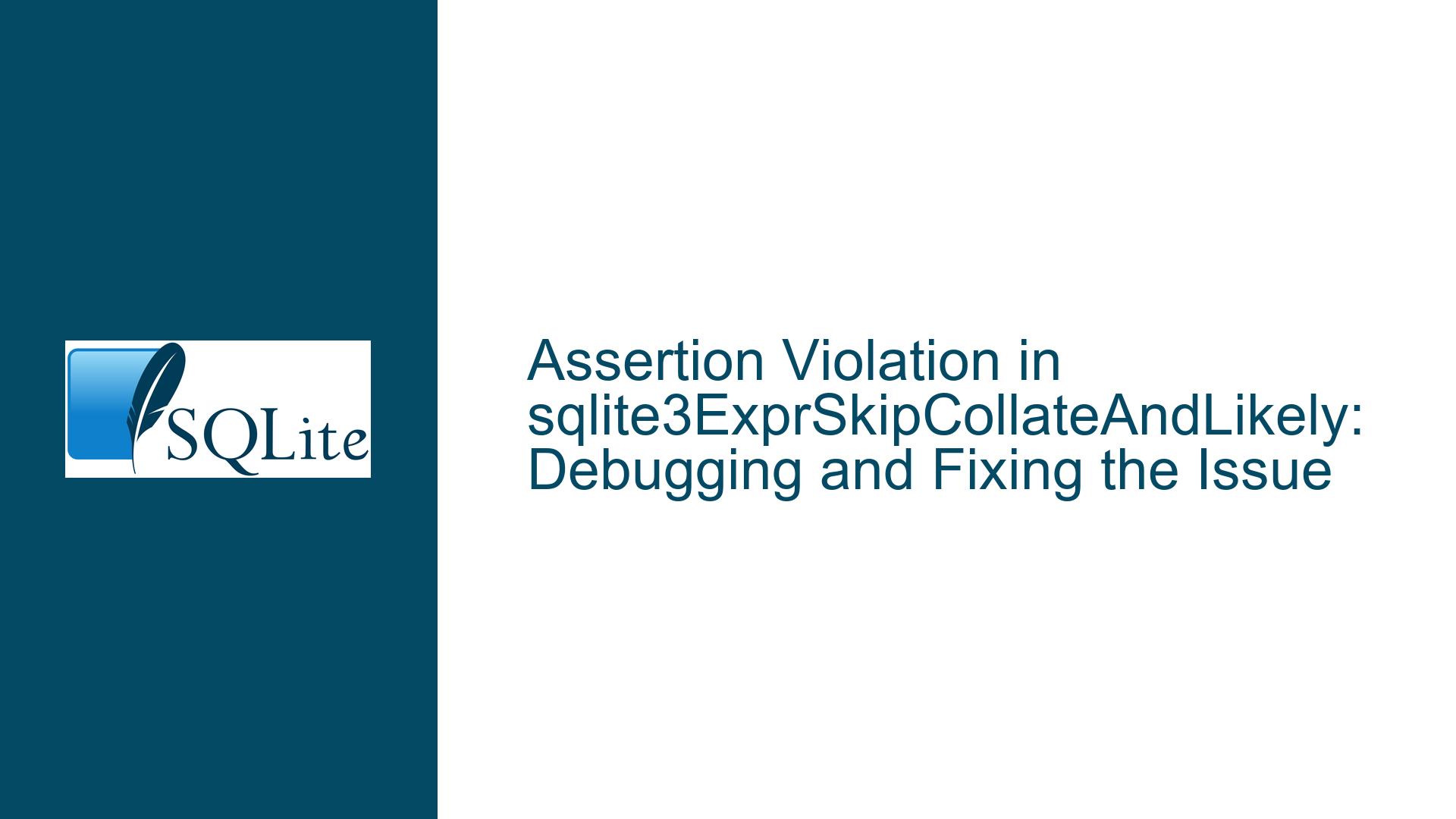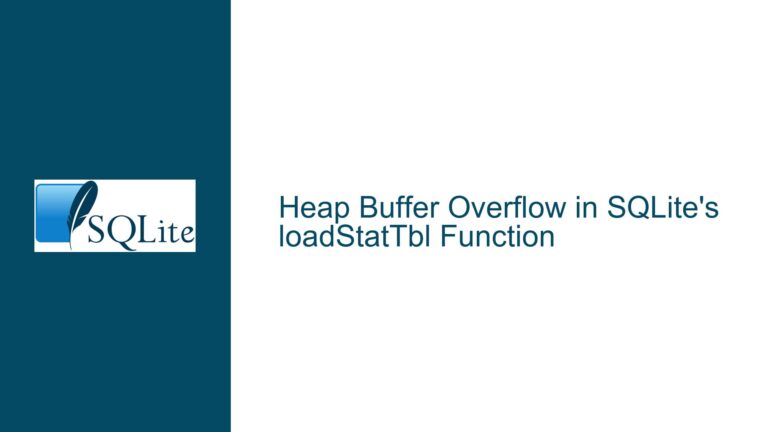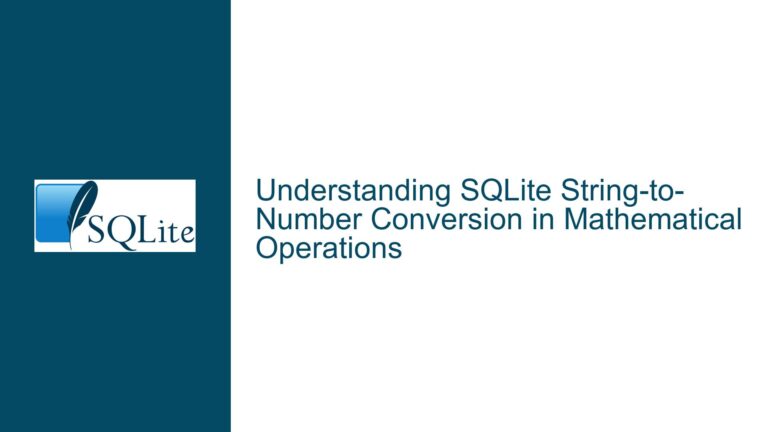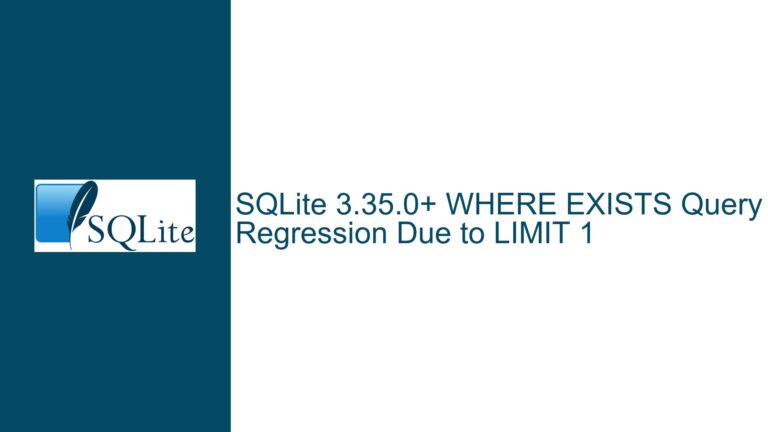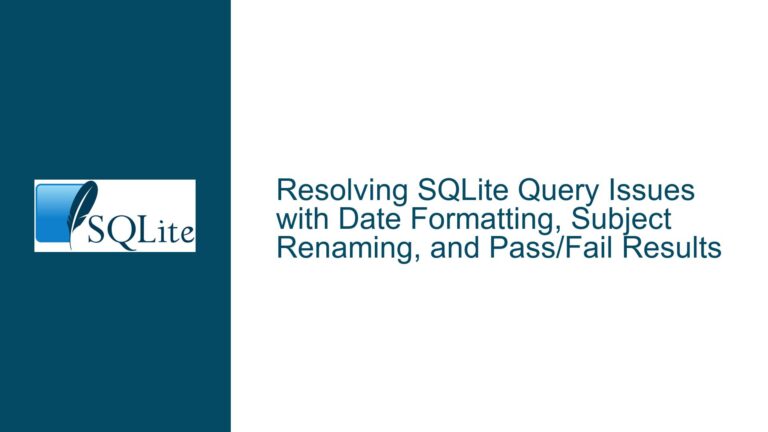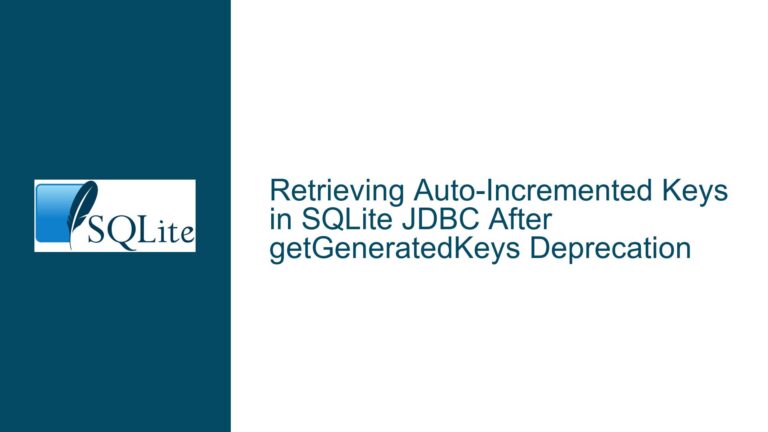Assertion Violation in sqlite3ExprSkipCollateAndLikely: Debugging and Fixing the Issue
Issue Overview: Assertion Failure in sqlite3ExprSkipCollateAndLikely
The core issue revolves around an assertion failure in the SQLite function sqlite3ExprSkipCollateAndLikely. This function is part of SQLite’s internal expression handling logic, specifically designed to skip over collation and LIKELY operators in SQL expressions. The assertion failure occurs because the function expects the input expression (pExpr) to have an operator type of TK_FUNCTION, but this condition is not met during execution. The failure is triggered when executing a complex SQL query involving the LIKELY function, FILTER clauses, and subqueries.
The query in question creates a table t2 with a single column mx_payload, indexes it using the LIKELY function, and then performs a SELECT operation with nested expressions. The assertion violation suggests that the SQLite engine is encountering an expression that does not conform to the expected structure, leading to a crash.
This issue is particularly significant because it involves SQLite’s internal expression handling, which is critical for parsing and executing SQL queries. Assertion failures in such low-level functions often indicate deeper logic errors or edge cases that were not accounted for during development. The presence of the LIKELY function, which is used for query optimization hints, further complicates the matter, as it interacts with SQLite’s query planner and expression evaluation logic.
Possible Causes: Why the Assertion Fails
The assertion failure in sqlite3ExprSkipCollateAndLikely can be attributed to several potential causes, each rooted in the interaction between SQLite’s expression handling logic and the specific query structure. Below are the most plausible explanations:
Incorrect Expression Type Handling:
The functionsqlite3ExprSkipCollateAndLikelyassumes that the input expression (pExpr) is of typeTK_FUNCTION. However, the query includes nested expressions involvingLIKELY,FILTER, and subqueries, which may result in an expression type that does not match this assumption. For example, theLIKELYfunction might be applied to an expression that is not a function call, or the query planner might transform the expression in a way that invalidates the assumption.Query Planner Transformations:
SQLite’s query planner performs various optimizations and transformations on SQL queries before execution. These transformations might alter the structure of expressions in ways that are not anticipated bysqlite3ExprSkipCollateAndLikely. For instance, the planner might inline subqueries or simplify expressions, leading to a mismatch between the expected and actual expression types.Edge Case in
LIKELYFunction Usage:
TheLIKELYfunction is typically used as an optimization hint to inform the query planner about the expected outcome of a condition. However, its usage in the query is unconventional, involving nestedLIKELYcalls and interactions withFILTERclauses. This unconventional usage might expose an edge case in SQLite’s handling of theLIKELYfunction, causing the assertion to fail.Interaction with
FILTERClauses:
TheFILTERclause in SQLite is used to apply conditional aggregation. In the query, theFILTERclause is used in conjunction with theLIKELYfunction, which might create a complex expression structure thatsqlite3ExprSkipCollateAndLikelyis not equipped to handle. The interaction between these features could lead to the assertion failure.Indexing with
LIKELY:
The query creates an index on themx_payloadcolumn using theLIKELYfunction. This is an unusual use case, as indexes are typically created on column values rather than function results. The presence of such an index might influence the query planner’s behavior in unexpected ways, contributing to the assertion failure.
Troubleshooting Steps, Solutions & Fixes: Resolving the Assertion Violation
To address the assertion violation in sqlite3ExprSkipCollateAndLikely, a systematic approach is required. Below are detailed troubleshooting steps, potential solutions, and fixes:
Validate Expression Types:
The first step is to verify the types of expressions passed tosqlite3ExprSkipCollateAndLikely. This can be done by adding debug logging to the function to print theopfield of thepExprparameter. If the expression type is notTK_FUNCTION, the function should handle it gracefully instead of asserting. For example:if (pExpr->op != TK_FUNCTION) { sqlite3_log(SQLITE_WARNING, "Unexpected expression type: %d", pExpr->op); return pExpr; }Review Query Planner Logic:
Examine the query planner’s transformations to ensure that they do not produce expressions that violate the assumptions ofsqlite3ExprSkipCollateAndLikely. This might involve tracing the query planning process and identifying any transformations that alter expression types. If necessary, modify the planner logic to preserve the expected expression structure.Handle Edge Cases in
LIKELYFunction:
Update the implementation ofsqlite3ExprSkipCollateAndLikelyto handle edge cases involving theLIKELYfunction. For example, ifLIKELYis applied to a non-function expression, the function should skip it without asserting. This can be achieved by adding additional checks:if (pExpr->op == TK_LIKELY) { return sqlite3ExprSkipCollateAndLikely(pExpr->pLeft); }Improve
FILTERClause Handling:
Ensure thatsqlite3ExprSkipCollateAndLikelycorrectly handles expressions involvingFILTERclauses. This might involve extending the function to recognize and skipFILTER-related nodes in the expression tree. For example:if (pExpr->op == TK_FILTER) { return sqlite3ExprSkipCollateAndLikely(pExpr->pLeft); }Reevaluate Indexing Strategy:
Consider whether indexing with theLIKELYfunction is necessary or appropriate. If not, recommend creating the index on the column value directly. If the index is required, ensure that the query planner and expression handling logic are updated to support this use case.Add Comprehensive Test Cases:
Develop test cases that cover the specific query structure and other edge cases involvingLIKELY,FILTER, and subqueries. These test cases should be added to SQLite’s regression test suite to prevent future regressions.Engage with the SQLite Community:
Share the findings with the SQLite development community to gather feedback and identify potential fixes. The community might have encountered similar issues or have insights into the underlying cause.Apply the Fix and Verify:
Once the necessary changes are implemented, rebuild SQLite and verify that the assertion violation no longer occurs. Ensure that the fix does not introduce new issues by running the full regression test suite.
By following these steps, the assertion violation in sqlite3ExprSkipCollateAndLikely can be resolved, ensuring robust handling of complex SQL queries involving LIKELY, FILTER, and subqueries. This approach not only addresses the immediate issue but also improves the overall reliability of SQLite’s expression handling logic.
